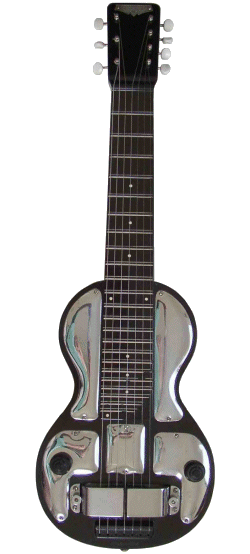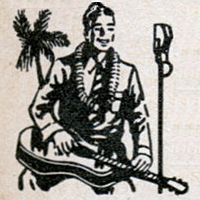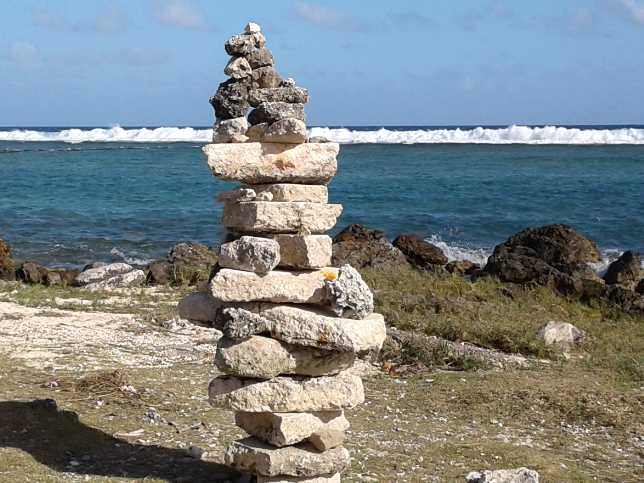Thoughts On Rickys (Rickenbacher and Rickenbacker)
 If
you love Hawaiian steel guitar and you have never played through a Ricky,
you are missing out my friend. Once you've experienced the sweet tone of a
prewar Rickenbacher (or spelled “Rickenbacker” post World War II), you'll
instantly feel the difference and want to have one for your very own. Trust
me! I didn't know any better, having played a cheap Artisan $79 lapsteel for
a year to learn on. But once I had the privilege of trying a Ricky, my mind
was blown away by the difference in feel and tone, and sustainable
harmonics. Wow!!! Those harmonics notes just keep ringing with sustain on a
Ricky. Nice!
If
you love Hawaiian steel guitar and you have never played through a Ricky,
you are missing out my friend. Once you've experienced the sweet tone of a
prewar Rickenbacher (or spelled “Rickenbacker” post World War II), you'll
instantly feel the difference and want to have one for your very own. Trust
me! I didn't know any better, having played a cheap Artisan $79 lapsteel for
a year to learn on. But once I had the privilege of trying a Ricky, my mind
was blown away by the difference in feel and tone, and sustainable
harmonics. Wow!!! Those harmonics notes just keep ringing with sustain on a
Ricky. Nice!
A used Ricky lap steel will run you anywhere between $600 and $2500. Rickys were spelled Rickenbacher pre World War II and Rickenbacker post World War II. The body makes a big difference in a steel guitar. I put a 1955 Rickenbacker horseshoe pickup into my $79 Artisan just to see what would happen and it didn't sound any better, not one bit. It sounded the same. I tried wiring it a few different ways, but it didn't help. Those Bakelite Rickenbachers (prewar) and Rickenbackers (postwar) sound great because of the body as much as the horseshoe pickup. Both era of guitars are commonly termed “Ricky's.” Either pre or post war are fine.
The beautiful sound produced by a Ricky comes from the Bakelite material of the body, which is the same material that was used long ago to make bowling balls and hundreds of other products. Due to this unique composition, Ricky's chip easily if dropped onto a hard surface. Since Bakelite is a manufactured, synthetic plastic containing incredible amounts of formaldehyde, asbestos and other extremely toxic polymers, those who produced these desirable products, put themselves at risk. Just like any other plastic-based product, disposing Bakelite is extremely hazardous to the environment. To my understanding, for this reason Rickenbacker discontinued manufacturing Ricky's. Still, Bakelite is very safe unless it is ground into dust and breathed. I have two Bakelite Ricky's and would never sell them! One is a prewar from 1936, and the other is a postwar from 1953. I actually like playing the postwar Ricky because it has a tone control, which comes in handy for tone.
There's NO DIFFERENCE between the 1 1/2" verse 1 1/4" magnet width as far as tone in my opinion. I have both and cannot tell any difference in tone or sustain, but to each their own. If you feel better with 1 1/2" magnets, then that is what you should buy. Although Jerry Byrd considered the pre-wars collectors items, they don't sell for much more than postwar from what I've seen (because Hawaiian music is a rarity these days and not as popular as you'd think).
I recommend you buy a guitar with a tone control, it is important I think. The 7 and 8 string Bakelite Ricky's are very rare, but I prefer 6 strings myself, because that fits my style: simple and practical. Ninety-five percent of everything I play is on the first 6 strings. But if you like full chords then you MUST have 7 or 8 strings. There are some awesome D-8 and D-6 Ricky's out there... you can't beat the sound. Make sure to send out the horseshoe magnets to have them rejuiced if you buy a Ricky. The magnets lose their magnetism over the decades. Re-juicing them makes a big difference I think. In a Ricky, the pickup is composed of two U-shaped magnets (that is, horseshoes).
One irritating thing is the lack of identification marks on the fretboard. My Ricky's just have white dots. When I am playing faster, especially at the higher frets, it gets confusing quick. So what I did is take some White-Out and mark the 5th and 17th frets so I can quickly find them. That's was a tremendous help!
NOTE: NEVER buy a Ricky with either of the pots replaced because the awesome sound is GONE!!! I read a lot of posts where the seller sees he's not sure if the pots are original... THAT MEANS THEY'RE NOT!!! I know what I'm talking about because I tried it myself. I couldn't get the original pots back in fast enough! The sweet tone disappeared with the original pots!!! Those old original pots are a part of the sweet sound from a Ricky, not just the body. You cannot buy the original pots anywhere that I know of. Buyer beware! There's a lot of butchered Ricky's being pushed off on gullible buyers. The sellers strip them for their pots. They take the original tuning knobs. This is why I HIGHLY recommend only buying a Ricky from a reputable music store like Elderly Instruments in Michigan. Beware of Ebay! I have even been cheated multiple times in the Steel Guitar Forum, sad to say, and the forum moderators it seems cannot or won't do anything about it, which is sometimes a haven for thieves.
It's recommended that you buy a 5 x 8 rug or so to play on, in case you drop your Bakelite lap steel. The Bakelite Ricky's chip VERY easily if dropped on a hard surface (you see them all the time on Ebay). I like to play in the sand better yet at the beach, where Hawaiian music sounds the best.

Take someone to the islands today with your music!

ABOVE PHOTO: Asan Beach, Guam; March 4, 2018. Rock stacking is a favorite activity amongst islanders. In the background is the Philippine Sea. In 1944, there were 8,000 brave U.S. marines killed during the liberation of Guam from the occupying Japanese. Asan Beach was at the heart of the battle.
BELOW PHOTO: Two beautiful rainbows I photographed at Asan Beach on 12-24-2017. Just like a diatonic music scale with 7 notes, our amazing God created the rainbow with 7 colors...




